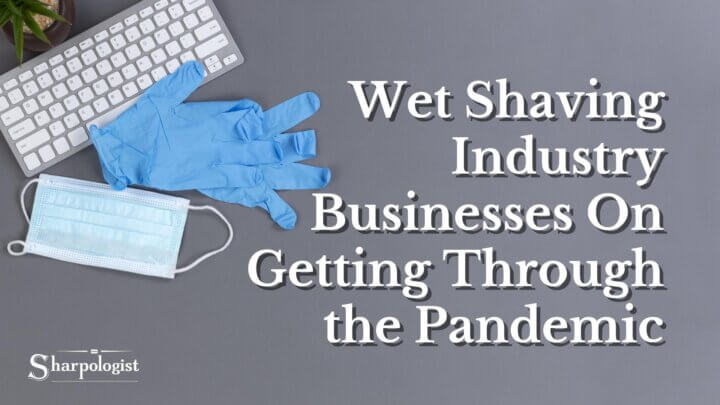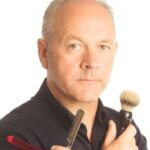
The pandemic has hit many businesses hard. Sharpologist asked several leading companies in the shaving and personal care industry to share how their operations have held up over the past year.
Participants
Participants included:
- Joseph Abbatangelo, President of Italian Barber
- Brad Maggard, Founder, Maggard Razors
- Danielle Malka, Founder/CEO of eShave
- Andreas Müller, Managing Director and shareholder of MÜHLE
- Brian Mulreany, Sales Director and Shaving Expert, The Executive Shaving Company
Did the pandemic affect your sales?
Joseph Abbatangelo: Yes, from March to September of 2020, sales dropped quite a bit. Then, they started to stabilize a little. In 2021, sales seem to be a little better.

Brad Maggard: Sales grew for us in the low single digits in 2020 when compared to 2019, despite our showroom being closed to the public for approximately eight months of the year. The only significant slowdown in sales was a six-week period starting in March 2020 when the initial lockdowns made the entire retail market uncertain. I think most people were worried about bare necessities (food, TP, etc.!).
Danielle Malka: When the pandemic started and toilet paper started to run out on store shelves, it created a surge of orders from our customers ordering in multiples as if worried we would also run out of stock. We first had a small slowdown when the news about the pandemic got around followed with a sharp increase. We ended up with an increase of around 40% of our direct to consumers orders. This was very welcome as it compensated for the loss of orders coming normally from our international distributors. This trend got more stable as time went by and allowed us to end the year as previous year sales, which in view of the situation was satisfactory.
Andreas Müller: We have had ups and downs during the pandemic. The announcement of lockdowns caused a drop of order volumes, yet the sales recovered quickly. Especially in late summer and towards the end of the year the volumes increased. Consequently, our business grew significantly in 2020. We believe people are having more time to search online for products. Also, the extra time for personal care supported our business and pampering yourself has gained more importance during these difficult times.
Brian Mulreany: Yes, sales increased dramatically from March 2020 onwards and this has continued through to 2021. This was down to several factors. When the pandemic started, we quickly sourced lots of liquid sanitizers and liquid hand soaps as government advice here was to wash your hands several times daily. Sales of these items drove sales from March through to June. Thereafter people had time on their hands and money to spend so they upgraded their shaving kit and they were keen to try new ways of shaving such as with safety razors, shavettes and cut throats.
Have you experienced any significant changes in sales patterns among your different product categories?
Joseph Abbatangelo: Sales of higher-priced soaps and aftershaves have dropped off the last 12 months.
Brad Maggard: Sales have been steady across all categories. The only major impact was due to reduced foot traffic. Since we were closed to the public, we sold a lot less beard grooming supplies, which was one of our most popular walk-in products among locals.

Danielle Malka: The first thing we noticed was at the beginning our regular customers bought multiples as if stocking up for the year, but as time passed and they got reassured, units’ quantities on orders went back to normal. We did notice, however, our customers reacting more to promotions we ran on accessories as we normally do in our marketing calendar. Last year, they purchased more accessories and more expensive ones, as if they seem to have more time to shop around, understood the value and wanted a little more to indulge.
Andreas Müller: We haven’t seen a specific trend towards higher or lower priced items. For a longer period of time people seem to focus on well-made products that last. Also, detailed product knowledge – knowing how things are made – matters to people. Furthermore, we know that people are willing to spend more on personal care items in order to pamper and spoil themselves.
Brian Mulreany: Sales of Japanese Feather safety razors and our own Outlaw safety razors soared, and neither are cheap razors. We also saw significant demand for top end shaving software made by Martin de Candre and Castle Forbes. My theory is that men had money to spend and time on their hands and they thought now’s the time to pamper myself, after all, who knows what tomorrow may bring?
Did the pandemic cause any disruptions in your supply chains?

Joseph Abbatangelo: Yes, definitely! Many suppliers in Italy and Europe shut down for extended periods and it was tough to get the product. Input costs have sky-rocketed, such as alcohol, base oils, stainless steel, etc. We are definitely seeing a lot of inflation with the input costs of our products.
Brad Maggard: Yes. Several suppliers had problems sourcing various critical items (jars, perfumers alcohol, etc.), which left us with bare shelves on many product lines. As for our house branded items, we saw typical production times increase by about 50%. The three-month lead time products became four-and-a-half month lead time products.
Danielle Malka: Luckily as we had a very strong holiday season in 2019, we knew we would need to replenish our stocks for January and therefore placed our major raw material orders in November. That allowed us to run our spring-summer production early and had us somehow beat the March and later shortage of packaging, etc. We were able to sustain our business and allow for longer leeway on raw material and packaging delivery for the second part of the year. We had, however, to place our holiday order as early as April, which is unusual for us. This was not something we expected or could have prepared for.
Andreas Müller: MÜHLE has a very high in-house production rate so disruptions of supply chains was not a major issue.
Brian Mulreany: Yes, in March and April we were selling hundreds of Geo F Trumper liquid hand sanitizers every week but they then ran out of stock so we sourced a similar product from Morgan’s until stock there dried up, too. Fortunately, we had asked Face & Body, a Scottish soap maker who makes our Intensive Balm, to start work on a liquid soap and a sanitizer for us and they were able to supply us so the wheels continued to turn.
Our own brand shaving creams and matching balms are made in England and the manufacturer closed down for a few months and when they reopened, due to social distancing they only had a 30% headcount. Getting stock from them has been very challenging indeed and this continues to be a source of concern. They are slowly getting back to normal and in the next few weeks we should have all the stock we need.
Did any other significant trends emerge for your business during the pandemic?
Joseph Abbatangelo: It seems many people are shaving and grooming less these days due to work-from-home and less in-person socializing. There also seem to be fewer wet-shaving hobbyists around and the rate of new traditional wet shavers has slowed down.
Brad Maggard: All carriers increased shipping rates significantly – many of our contracts with FedEx and UPS saw increases of around 30%. For us to ship an average order to one of our customers, we are now paying between $8.20 and 9.90 depending on the service.
In addition, the delays caused by the pandemic in shipping were extraordinary and have still not fully recovered.
When you combine these two facts, which were completely outside of our control, with the fact that the average customer has been conditioned to not only expect free shipping but be angry when things don’t arrive in expected times, it put our business in a difficult spot. It is really hard to maintain profitable businesses in this environment, when we sometimes were forced to refund shipping costs or reship orders to make our customers happy. Even though our sales were up in 2020, our net profits were actually down.
Danielle Malka: We had to restructure our logistics, which we brought back in-house as our bounded warehouse was short staff and could not fulfill orders in a timely manner. As we were already in conversation with them to do this move, the pandemic just expedited the decision. This was an adjustment but with our experience of running our own warehouse back in NY, we were able to jump back into in house shipment thankfully without major disruption.
Andreas Müller: Increased spending on personal care products, the importance of long lasting and well-made products, the zero-waste movement are definitely trends that have gained even more importance during the pandemic. Already before the pandemic the online sales volume of our products was significant. With the lockdowns we saw another shift of online sales.

Brian Mulreany: Yes, we now have some staff working from home and on a 6:00 a.m. until 2:00 p.m. shift to reduce footfall in our facility. This has worked well, and I see no need to change this. Personally, I don’t work on Friday, instead I do a half day on Saturday and get a full day’s work done as there are no interruptions such as incoming Live Chats and no phone calls to manage. Also, we have added lots of new customers shopping online with us as the retail stores they bought from before the pandemic were closed so they were forced to shop online.
If you did experience significant changes to your business, are things returning to pre-pandemic status?
Joseph Abbatangelo: Overall, our sales seem to be returning but the sales mix has changed quite a bit in our business.
Brad Maggard: In 2021 we have already found that demand is surging across all categories. We are on track for 10 – 12% growth in 2021 versus our already all-time highs in 2020.
Danielle Malka: Yes, since December our international distributors are back ordering from us and with the direct-to-consumer volume having maintained its trend, we are expecting this year to get back on track and end the year with a normal business growth and more.

Andreas Müller: In territories which are not as much online driven we definitely lost some volume. Even though online sales compensate for the loss this is a pity: brick-and-mortar retail is very important to MÜHLE. We benefit enormously from retail partners who are literally MÜHLE ambassadors and have detailed product knowledge. Also, we believe physical retail makes our cities more vibrant and interesting. Unfortunately, most of the shops are still closed everywhere. We will definitely put our focus on maintaining and re-establishing this distribution channel after the pandemic.
Brian Mulreany: Apart from a massive increase in sales volume and supply problems, we have continued to grow the business organically by introducing new products in 2020 including The Outlaw razor range and Lomond EDP.

